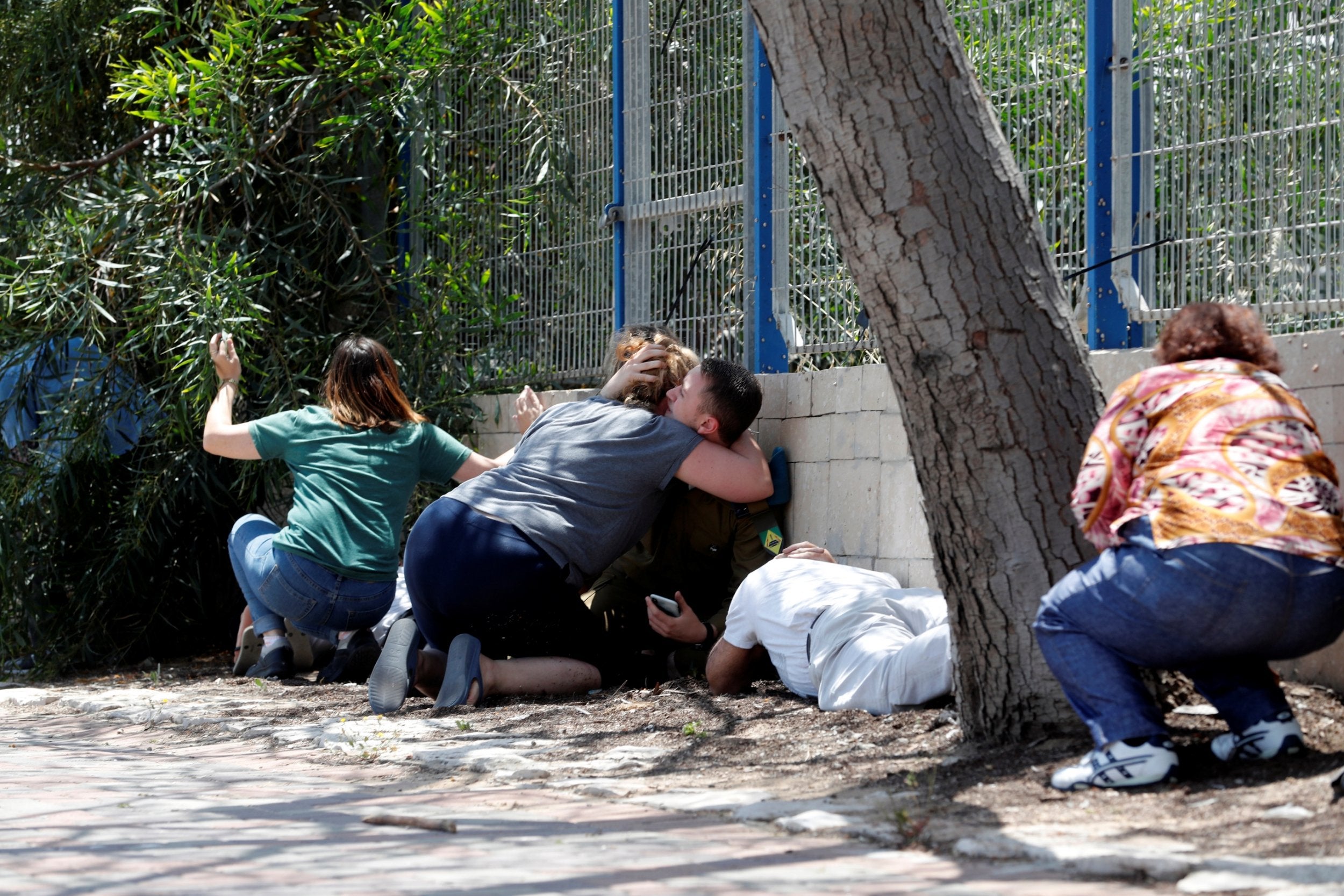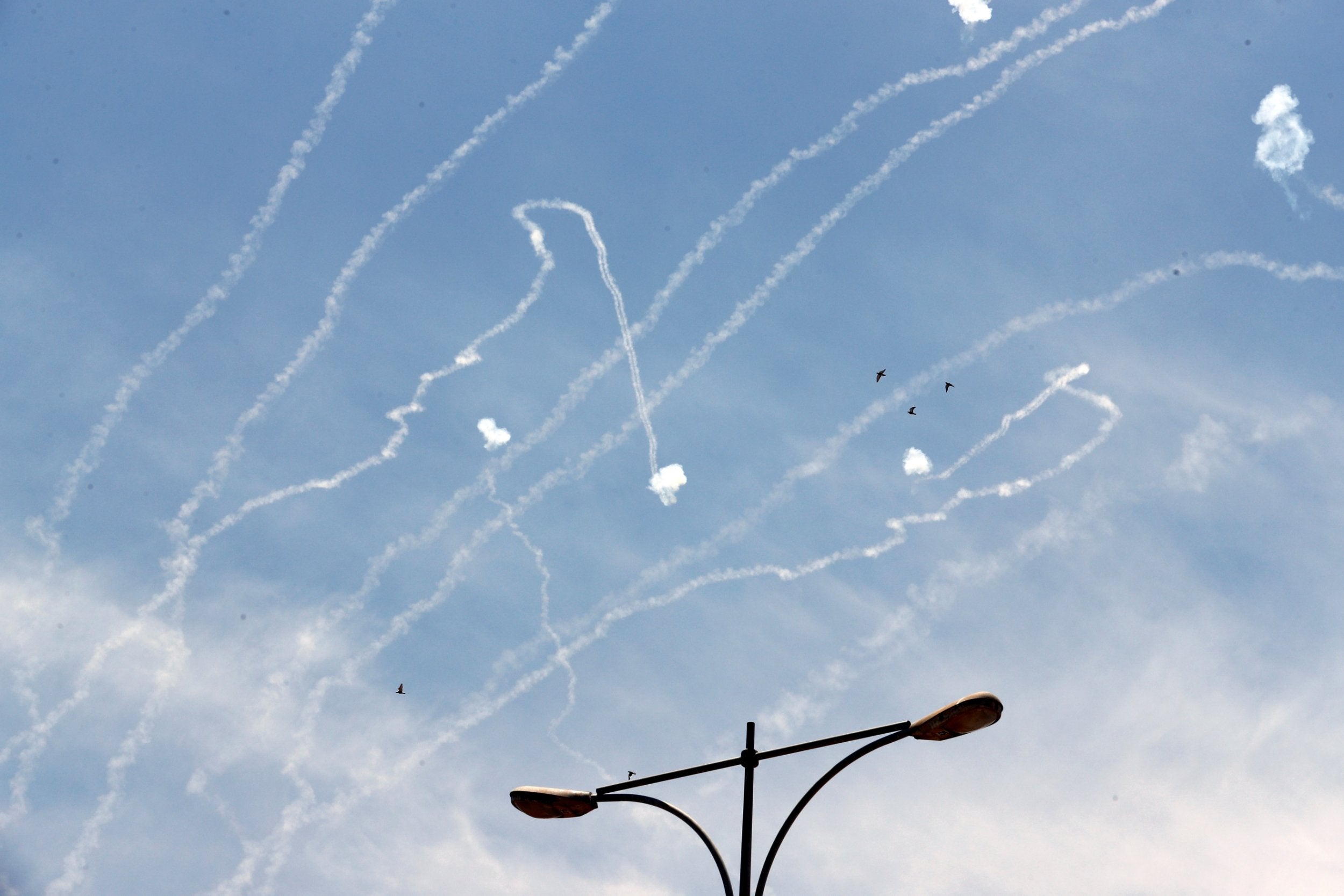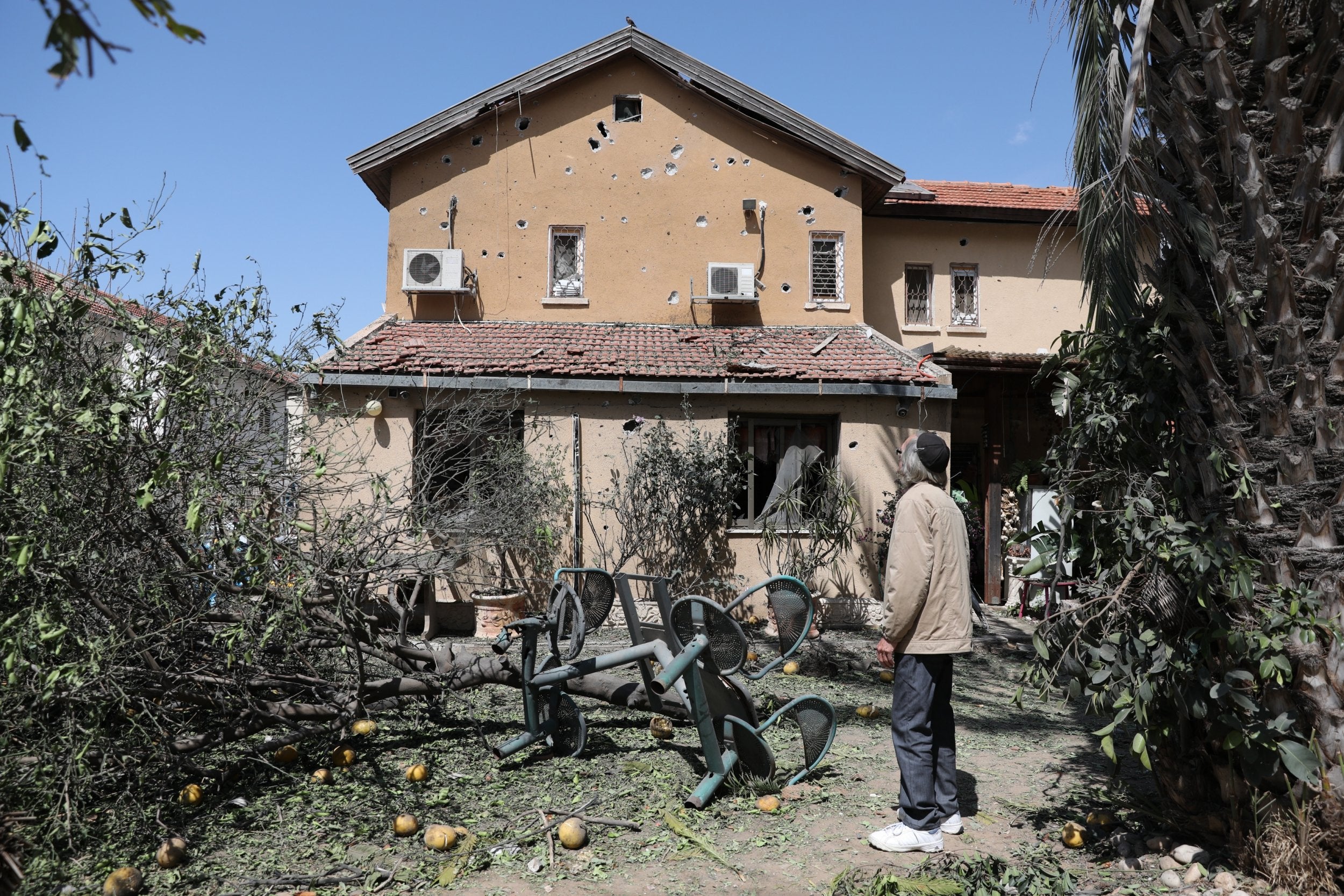Israelis angry at government inaction after Gaza attack: 'There was blood everywhere'
Dispatch: Workers at the Sela factory in Ashkelon recount the moment their colleague failed to make it to the bunker in time
When 20 separate rocket sirens blared just a few minutes apart, three of the workers in the south Israel factory gave up dashing for the bomb shelter, figuring it would probably be fine.
Inside the cement factory’s bunker, dozens of their colleagues, who had not taken the risk, held their breath and waited before resurfacing.
But something felt wrong. The ground had briefly shaken this time. And they could hear a strange noise.
Opening the fortified door, the screams began to filter through the haze.
Three men, covered in blood, one of them clutching his stomach, were staggering towards them.
A rocket fired by armed groups in Gaza had torn through the roof of the factory in Ashkelon – just nine miles (14km) from the border with the Palestinian enclave. It exploded on impact sending a spray of deadly shrapnel that ripped through the workers.
“There was blood everywhere and they were screaming ‘help me’,” one of the line managers at the Sela cement company told The Independent. He asked not to be named.
“Most of the people had made it to the bunker but when there are so many sirens you think it’s probably going to be OK to stay above ground,” he added.
He pointed to the dent in the dirt where the rocket had hit but showed how far the carnage reached: jagged holes chewed into the ceiling of the warehouse and nearby cabins.
“It was like there were nails or something in it. The debris punched holes right through the dining room cabin [10 metres away]. They don’t want to kill us they want to [maim] us”.
All three workers were hospitalised on Sunday afternoon. Zaid al-Hamamdeh, a 44-year-old Arab-Israeli worker from Be'er Sheva, succumbed to the wounds in his stomach.
He was one of four civilians in Israel killed by Palestinian rocket fire in the weekend's violence, with the deaths marking the first Israeli civilian fatalities since the last war with Gaza in 2014.
Armed factions in Gaza had on Saturday launched a barrage of nearly 700 rockets into Israel, in retaliation for the killings of four Palestinians, including two fighters, the day before, which in turn took place after two Israeli soldiers were injured in an earlier shooting incident along the border.

Israel responded with tank fire and air strikes pounding more than 350 sites in the besieged enclave. At least 25 Palestinians were killed, including two pregnant women and two children.
It was the latest and deadliest round of cross-border flare ups that have blighted the area in a nightmarish cycle of violence over the last year.
A tense and fragile truce brokered by Egypt was declared by Palestinian factions on Monday morning, which appeared to hold. But angry residents of Ashkelon, and other Israeli towns near to the border fences with Gaza, emerged from their bomb shelters fearful of the next round of violence.
“Life must go on, you can’t just stay in your home but it’s hard and we expect yet more violence. There isn’t a solution,” the Sela line manager said, echoing at least half a dozen other residents in the area.
“Most people are angry with the government. Protests are fine when you know what you want, but what can be done?” He asked.
Benjamin Netanyahu, the Israeli prime minister, recently re-elected for a record-breaking fifth term in office, has stopped short of declaring war in Gaza.
He promised on Monday “the campaign is not over” but did not explain how.

The Israeli army deployed additional infantry and armoured battalions to the border. They were poised to launch a ground incursion but ultimately did not.
"Over the last two days we struck Hamas and Islamic Jihad with great force. We hit over 350 targets," Mr Netanyahu said in statement, aimed to curry favour with the disgruntled south.
"The campaign is not over and it demands patience and good judgment. We are preparing to continue. The goal has been, and remains, ensuring quiet and security for the residents of the south,” he added.
Just a few minutes’ drive from the cement factory, is the house where Moshe Agadi, 58, a father of four, was killed by rocket shrapnel on Sunday morning, hours before Zaid al-Hamamdeh lost his life. The house is sprayed with shrapnel. Across the street, windows are smashed in.
There Agadi’s neighbours despaired, saying they felt the Israeli policy of sporadically bombing Gaza was not working and the authorities had to hammer out a long-term ceasefire so that civilians on both side of the border could be spared the onslaught.
Many feared that the Israeli government agreed to a truce with Hamas, the militant group which governs the Strip, this time because it did not want rockets raining down during the upcoming Independence Day holiday, or the Eurovision song contest finals that begin on 14 May in Tel Aviv, just 50 miles up the coast from Gaza.
Thousands of foreign visitors and dozens of performers including Madonna are expected to land in Israel this week ready for the celebrations.

Zariv, 42 a sales agent and father of three, who knew Mr Agadi’s family, said mourners at his funeral prayers on Sunday had to dash for the bomb shelter five times as they tried to pray under fire.
“We can’t even mourn. I just don’t see a solution or an end to this,” he said, describing how his own children are too afraid to go to the toilet on their own fearing more rockets.
“People are angry with Netanyahu because this keeps happening. We want him to take a harder approach with Gaza, we think he is being too soft but then what does being harder mean? Going in and [occupying] Gaza, no one wants that.”
Noa, 25, who lives nearby and is a kindergarten teacher, said the children she looks after are so traumatised they have started playing “rocket sirens” game in the playground.
“I worry for their futures. Right now this is all they know but I don’t know how to fix it,” she added.
Mariam, 60, who lives next door to the Agadi home said her five grandchildren, the youngest aged just one, threw up and then wet themselves when the rocket barrage hit their neighbourhood.
“The children began throwing up out of fear… Now they run for the bomb shelter whenever they hear the noise of a motorcycle,” she said, shaking her head in despair.
“It cannot be that every two months when someone wants something, the rockets start. There must be some sort of agreement with boundaries. We are tired of this. Everyone loses at war,” she added.
Join our commenting forum
Join thought-provoking conversations, follow other Independent readers and see their replies
Comments
Bookmark popover
Removed from bookmarks